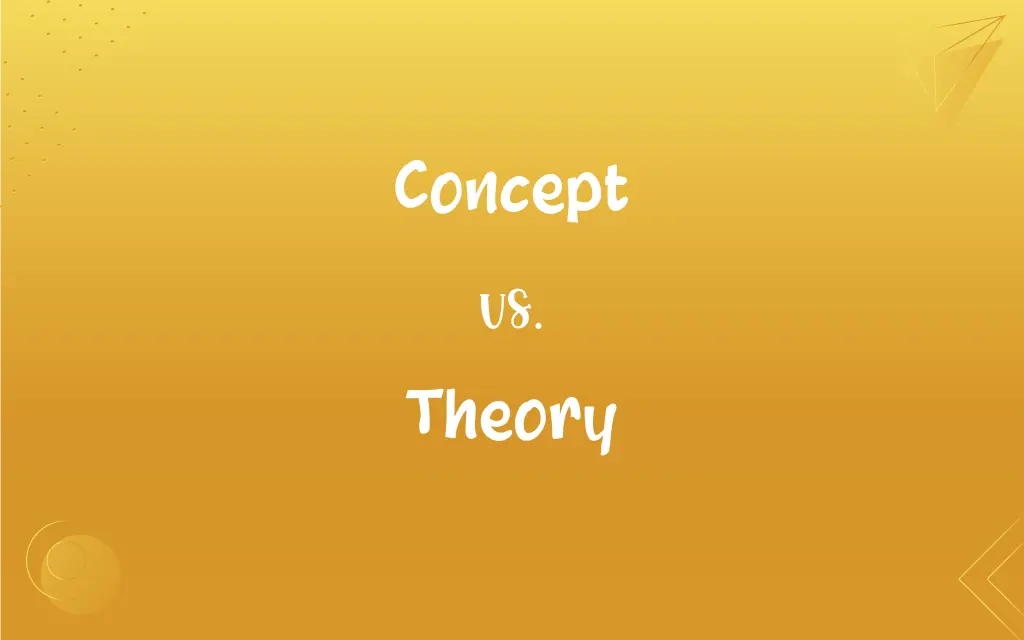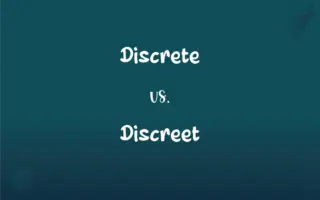Concept vs. Theory: What's the Difference?
Edited by Janet White || By Harlon Moss || Updated on October 15, 2023
"A concept is an idea or abstract principle, while a theory is a system of ideas intended to explain something based on evidence."

Key Differences
A concept is a general idea or understanding of something, often one that is unproven or still developing. It represents a mental image or symbolic representation of an idea, object, or process. On the flip side, a theory is a well-substantiated explanation of an aspect of the natural world that is acquired through the scientific method and repeatedly tested and confirmed through observation and experimentation.
The development of a concept is typically the initial stage in the thinking and research process. It's the seed or nucleus of thought from which more complex ideas grow. A theory, however, is more comprehensive. It's an established principle that explains some aspect of the world and predicts future outcomes, based on a consistently reproducible phenomenon.
Concepts are building blocks that contribute to a larger understanding, but they don't necessarily have a basis in reality—they're as subjective as they are speculative. Theories, in contrast, are grounded in empirical data; they're more than speculation as they are backed by evidence and scientific methodology.
In the realm of learning and understanding, concepts are akin to vocabulary, providing the definitions we need to explore ideas further. Theories are more like full-fledged sentences and paragraphs that use that vocabulary to convey detailed explanations and infer new conclusions.
In everyday language, people might use "concept" to refer to any idea in its early stages or an innovative plan or design. "Theory," however, often implies a much larger body of knowledge and a hypothesis that has been substantiated through extensive research and observation.
ADVERTISEMENT
Comparison Chart
Definition
An abstract idea or mental symbol.
An explanation based on observation.
Basis
Subjective, speculative.
Empirical, evidence-based.
Scope
Narrow, foundational.
Broad, explanatory.
Function
Represents understanding.
Explains and predicts phenomena.
Verification
Not necessarily proven.
Tested and confirmed.
ADVERTISEMENT
Concept and Theory Definitions
Concept
In technology, a concept can be an initial model of a new invention or innovation.
The engineering team developed a concept for a revolutionary new gadget.
Theory
In everyday use, a theory can simply mean a speculative idea or guess.
I have a theory about why the dog barks every time the phone rings.
Concept
In philosophy, a concept is a fundamental category of existence, understanding, or thought.
The concept of 'being' has perplexed philosophers for centuries.
Theory
In mathematics, a theory is a logical system comprising axioms, definitions, and theorems.
Number theory deals with the properties and relationships of numbers, particularly integers.
Concept
A concept is a mental representation or idea about something abstract or specific.
The concept of justice varies greatly across different cultures.
Theory
A theory is a tested, well-substantiated, unifying explanation for a set of verified, proven hypotheses.
Einstein's theory of relativity fundamentally changed the way we understand physics.
Concept
In business, a concept is an early plan or design for a new product or proposal.
The company revealed the concept for its innovative electric vehicle.
Theory
In music, a theory is a system of ideas intended to explain elements like harmony, melody, and form.
She's studying music theory to understand the structure behind her favorite compositions.
Concept
In art, a concept refers to the idea behind a work of art or an artistic movement.
His artwork challenges the traditional concept of beauty.
Theory
In literature, a theory is a systematic framework for understanding texts and their context.
Literary theory offers diverse approaches to understanding texts.
Concept
A general idea or understanding of something
The concept of inertia.
The concept of free will.
Theory
A set of statements or principles devised to explain a group of facts or phenomena, especially one that has been repeatedly tested or is widely accepted and can be used to make predictions about natural phenomena.
Concept
A plan or original idea
The original concept was for a building with 12 floors.
Theory
The branch of a science or art consisting of its explanatory statements, accepted principles, and methods of analysis, as opposed to practice
A fine musician who had never studied theory.
FAQs
What constitutes a theory?
A theory is an informed explanation that undergoes testing and is supported by evidence, explaining natural phenomena.
Can a concept be visual?
Yes, concepts can be visualized through diagrams, symbols, or designs.
How is a concept formed?
Concepts are formed through personal experiences, education, and cognitive processes.
Is a theory always scientific?
While theories are often scientific, the term can also refer to speculative ideas in everyday language.
What verifies a theory?
A theory is verified through consistent evidence, experimentation, and peer review.
Can a concept be proven?
Concepts represent ideas and aren't "proven" in the scientific sense, but they can be widely accepted or supported.
Do concepts exist in all cultures?
Yes, though the specifics of concepts can vary greatly across different cultures.
Can anyone propose a theory?
Anyone can propose a theory, but for it to be recognized, it must undergo rigorous testing and validation.
How do concepts influence thinking?
Concepts shape our understanding, categorization, and approach to problems and ideas.
Are concepts tangible?
Concepts are intangible and exist as mental constructs or ideas.
What's a theory's role in science?
In science, theories unify and explain findings, guiding research and fostering understanding of natural phenomena.
What is a concept?
A concept is an abstract idea or a mental symbol, typically based on one's understanding and perceptions.
Are theories subject to change?
Yes, theories can change or be refined as new evidence or research emerges.
How do theories apply to everyday life?
Theories help explain the world around us and can influence daily decisions and understanding.
What differentiates a good theory?
A good theory consistently predicts outcomes, is supported by evidence, and is subject to falsifiability.
Do concepts evolve over time?
Yes, concepts can evolve as perceptions, knowledge, and cultures change.
Who typically formulates theories?
Theories are often formulated by experts or researchers in a specific field.
Can concepts be shared and communicated?
Yes, concepts can be shared, discussed, and refined through communication.
Can a theory become a fact?
Theories explain facts but are separate; they're comprehensive explanations supported by facts.
How broad can a concept be?
Concepts can be broad or specific, depending on the context and the subject.
About Author
Written by
Harlon MossHarlon is a seasoned quality moderator and accomplished content writer for Difference Wiki. An alumnus of the prestigious University of California, he earned his degree in Computer Science. Leveraging his academic background, Harlon brings a meticulous and informed perspective to his work, ensuring content accuracy and excellence.
Edited by
Janet WhiteJanet White has been an esteemed writer and blogger for Difference Wiki. Holding a Master's degree in Science and Medical Journalism from the prestigious Boston University, she has consistently demonstrated her expertise and passion for her field. When she's not immersed in her work, Janet relishes her time exercising, delving into a good book, and cherishing moments with friends and family.
































































